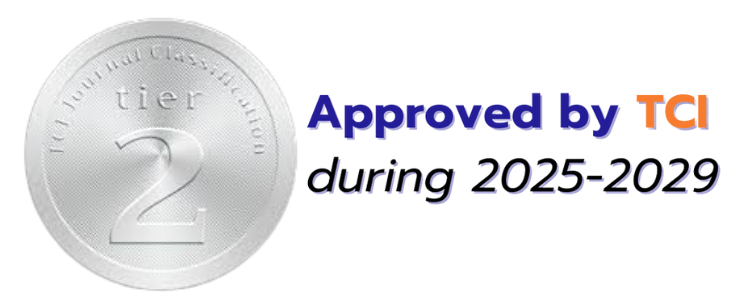The Study of a Coding Learning Management though the Problem-Based Approach to Promote Collaborative Problem-Solving Competency for Grade-10 Students.
Keywords:
Coding Learning, Problem based learning, Collaborative problem-solving competencyAbstract
This research aims to study the condition of coding learning management by using the problem-based approach to promote the collaborative problem solving and to compare the cooperative problem-solving performance of Grade-10 students both before and after the learning management. The research process is action research according to Kemmis & Schmuck's concept, divided into 4 steps: Step 1 Plan, Step 2 Act, Step 3 Observe and Step 4 Reflect. The sample used in the research were students in Mathayomsuksa 4/1 of Kasetsart University Laboratory School Kamphaeng Saen Campus Educational Research and Development Center, 35 people by using Cluster Sampling method. The research findings were as follows: 1) The study of coding learning management by using problem-based learning to promote cooperative problem-solving competency for Mathayomsuksa 4 students consisted of 6 steps: Step 1 defines Problems, step 2: understanding the problem, step 3, conducting studies, step 4 synthesizing knowledge, step 5 summarizing and evaluating answers, and step 6, presenting and evaluating. 2) Comparison of cooperative problem-solving performance of Mathayomsuksa 4 students between before and after learning from coding learning management (Coding) using problem-based learning management The ability to choose an appropriate action to solve problems was 57 percent of which had a high level of performance.
Downloads
References
Draghicescu, L. M., Petrescu, A. M., Cristea, G. C., Gorghiu, L. M., & Gorghiu, G. (2014).
Application of problem-based learning strategy in science lessons–Examples of good
practice. Procedia-Social and Behavioral Sciences, 149, 297-301.
Greenwald, N.L. (2000). Learning from problems. The Science Teacher, 67, 28-32.
Jahanzad, F. (2012). The influence of the DEEPER scaffolding framework on problem solving
performance and transfer of knowledge. Stillwater, Oklahoma: Oklahoma State University.
Kemmis, S. & McTaggart, R. (1988). The Action Research Planer (3rd ed.). Victoria: Deakin University.
Khaemmanee, T. (2014). The science of teaching knowledge for effective learning process
management. Bangkok: Chulalongkorn University Printing House.
Khwana, K. & Khwana, T. (2019). The Instruction to Promote Learning Skills in 21ST Century.
Journal of Graduate School, 16(73), 13-22.
Kijkuakul, S. (2014). Learning Management of Science in 21st Century. Phitsanulok: Naresuan
University Publishing House.
Kijkuakul, S. (2014). Science teaching: The direction for 21 Century teacher. Phetchabun: Julladis printing House.
Ministry of Education. (2001). Basic Education Core Curriculum B.E.2544(A.D.2001). Bangkok:
Ministry of Education Thailand.
Klomim, K. (2017). How To Learning Problem Based Learning: Coursed Design and
Development Coursed for Students Teachers. Journal of Graduate Studies Valaya Alongkron
Rajabhat University, 11(2), 179-192.
Naboonmee, P., Bongkotphet, T. & Thountom, S. (2017). Problem-Based Learning for Developing
Collaborative Problem Solving Competency in Rotational Motion Topic for Grade 10Th Students. Journal of Education Mahasarakham University, 13(2), 193-205.
OECD. (2013). PISA 2015: Draft collaborative problem solving framework. Paris: OECD Publishing.
Office of the Education Council. (2007). Student-Centered Learning Management: Problem–based
Learning. Bangkok: The Agricultural Co-operative Federation of Thailand printing house.
Panghom, R., Srisanyong, S., & Teeravanitrakul, S. (2016). Construction of learning packages using
a problem-based approach relating geographical phenomena for matthayomsuksa IV
students. Journal of Education Naresuan University, 18(4). 278-293.
Phasuk, P. (2016). An action research for enhancing collaborative problem solving
competency of grade 10 students in topic “Digestive System” using learning management
through DEEPER scaffolding framework [Master thesis, Naresuan University].
Puechsing, Y. and Cojorn, K. (2021). The development of Computational Thinking Skills Using
Problem Based Learning and Social Network for Eight Grade Students. Rajabhat Maha Sarakham University Journal, 16(1), 40-52.
Rueangrong, P. and Phitthayasenee, M. (2020). Computational concept is combined with the coding
learning management model to enhance Collab. The Office of Academic Promotion and Registration
Kamphaeng-Phet Rajabhat University, 11(1), 1-16.
Sesai, N. et al. (2017). The Effects of Problem – Based Learning to Enhance Life Skill in Creative
Problem- Solving Ability of Grade Five Students in Learning Area of Occupations and
Technology, Assumption College English Program School, Samut Sakhon Province. Journal
of Kasetsart Educational Review, 32(1), 80-90.
Smit, J. et al. (2012). Conceptualisation of whole-class Scaffolding. British Educational Research
Journal, 39(5), 817-834.
Tayom, C., Kijkuakul, S. and Klamtet, J. (2017). Action Research for Developing Collaborative
Problem Solving Competency by Using DEEPER Scaffolding Framework on Stoichiometry
Topic for Enrichment Science Classroom, Mathayom Suksa IV Students. Academic Services
Journal, Prince of Songkla University, 28(2), 34-45.
Wongwanich, S. (2008). Classroom Action Research. Bangkok: Chulalongkorn University Printing House.
Downloads
Published
Issue
Section
License
Copyright (c) 2024 วารสารศาสตร์การศึกษาและการพัฒนามนุษย์

This work is licensed under a Creative Commons Attribution-NonCommercial-NoDerivatives 4.0 International License.







